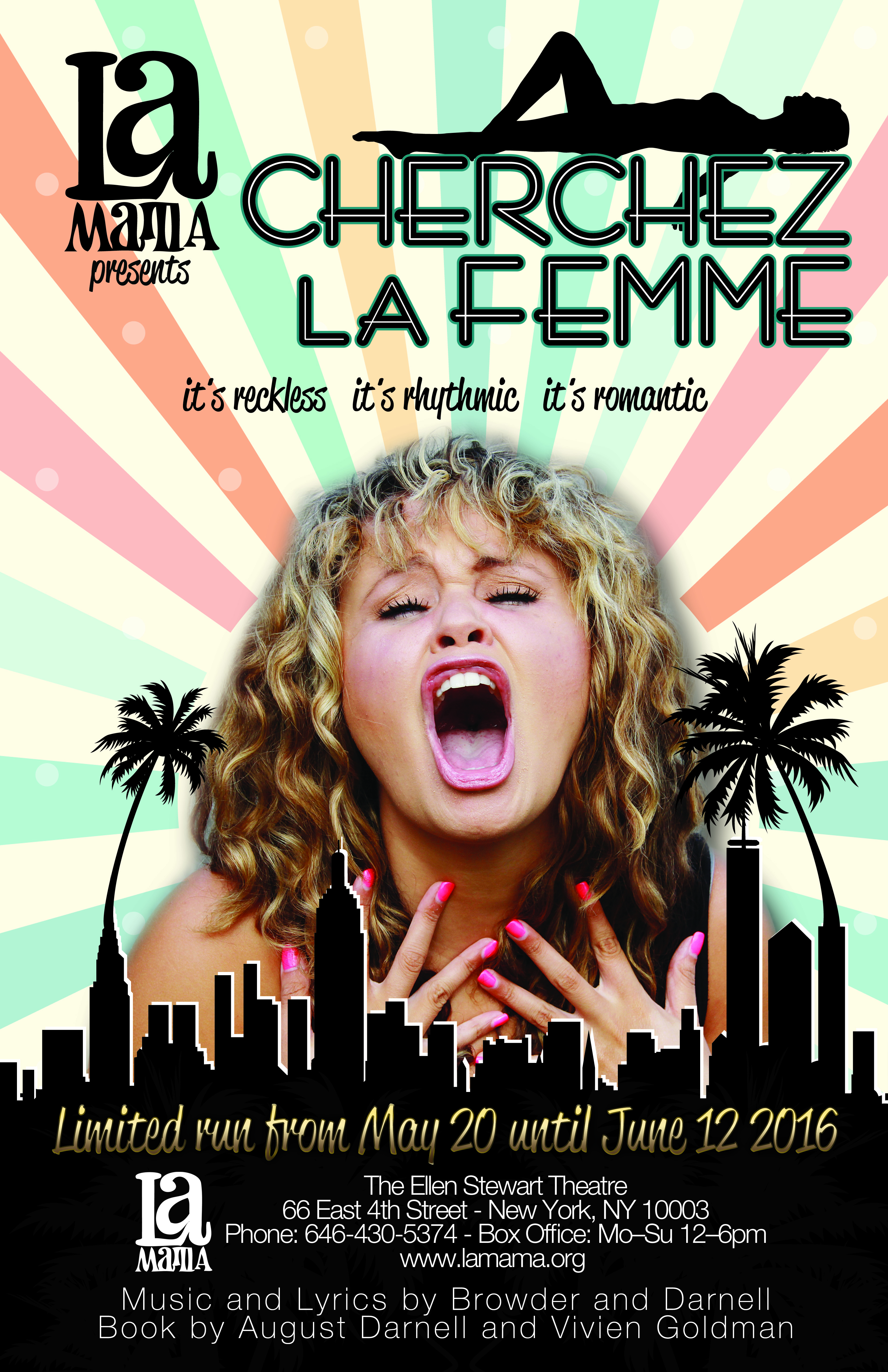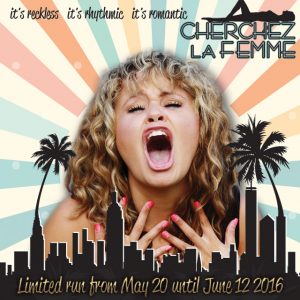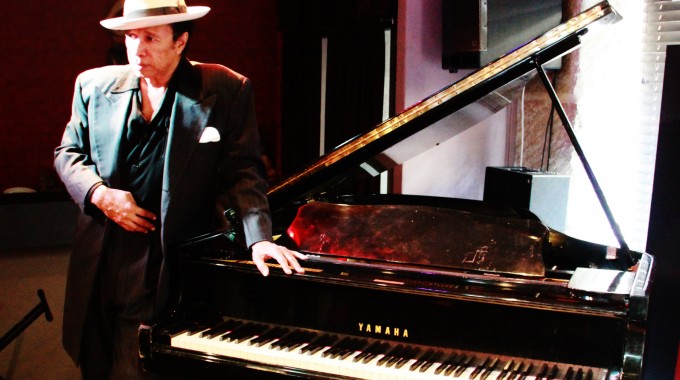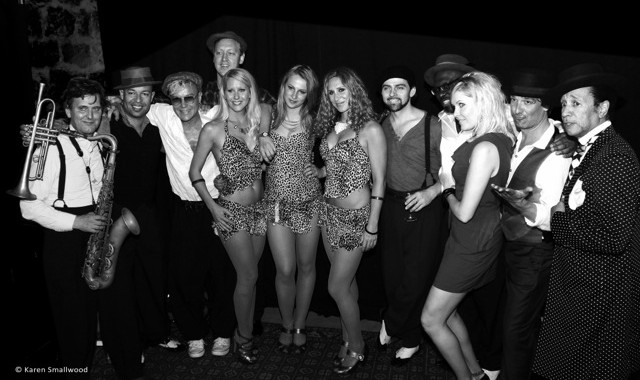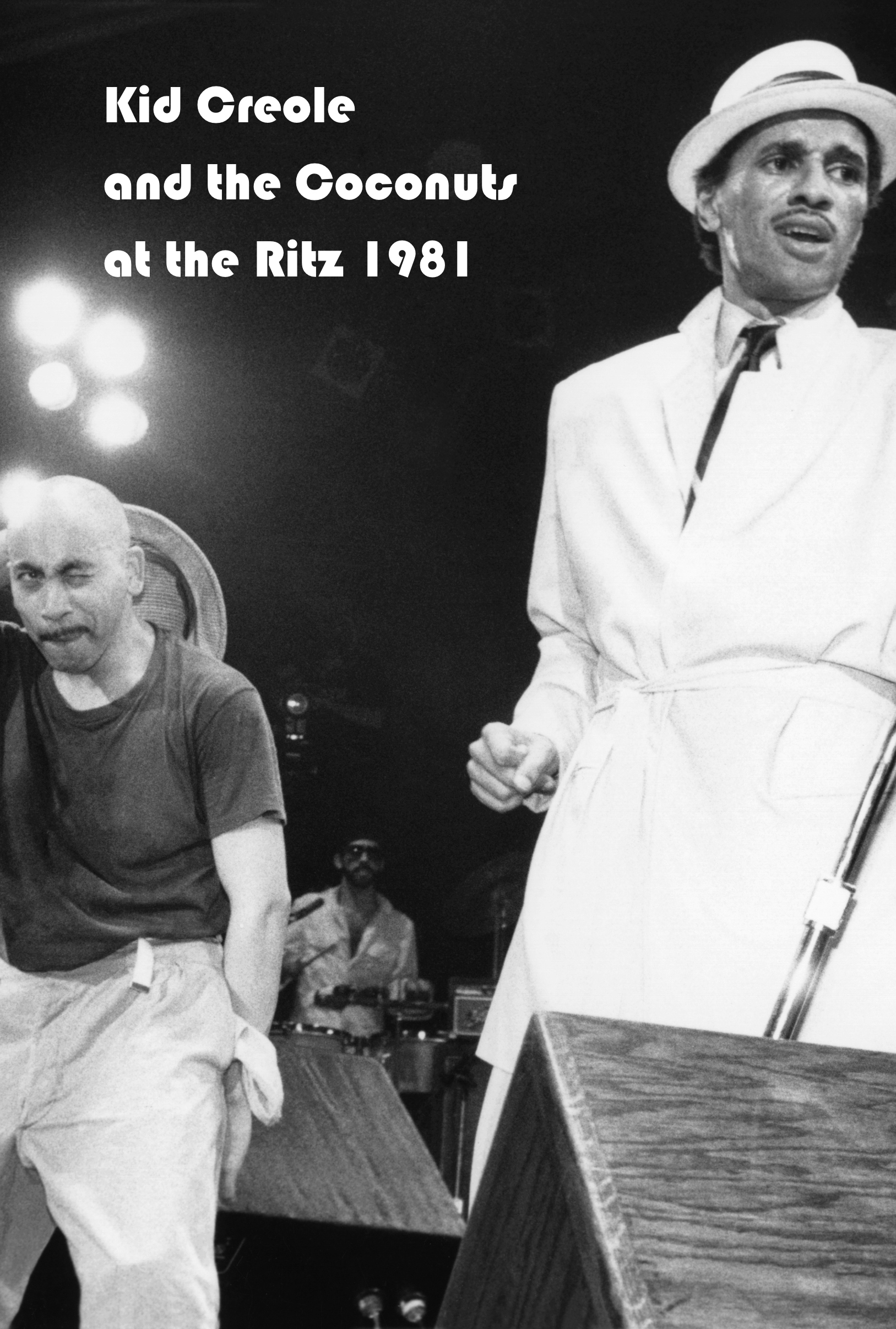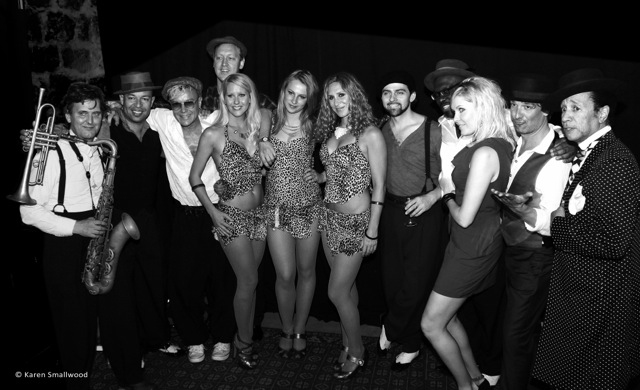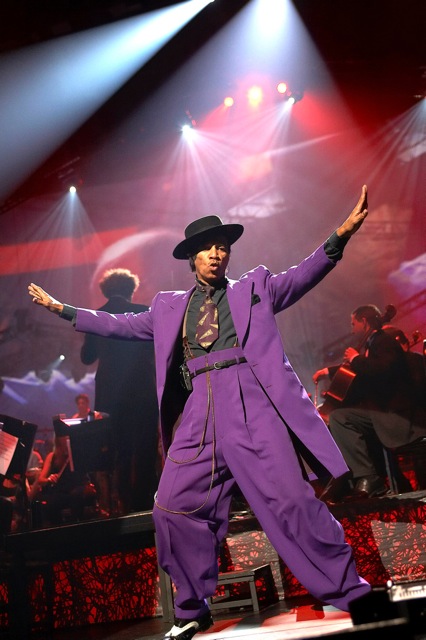August Darnell and Stony Browder, Jr. in collaboration with Cory Daye, Andy Hernandez, and others wrote, performed, and arranged–alone and in various combinations, under a variety of names–a handful of pop tunes of enduring oddness and charm: “Cherchez La Femme/Se Si Bon,” “Sour & Sweet/Lemon In The Honey,” “Mister Love,” “An Organ Grinder’s Tale,” The Seven Year Itch,” There But for the Grace of God Go I,” “Drive My Car,” Cowboys & Gangsters,” and “Deputy of Love.”
Unlike the other memorable music of its era, Browder and Darnell’s is not raw, not direct, not antagonistic, not violent. It’s generally dance music, but of such a kind that repays scrutiny. It tickles, then alarms, then reassures, then renders unsure.
Browder and Darnell juxtaposed disco’s present tense of physical exhilaration, affectionately ironic allusions to retro dance styles, and lyrics whose often jolting bitterness resonates like an shouted threat. They toyed with these things to create a compelling disequilibrium.
Savannah Band was originally labeled a disco band because they obviously weren’t a conventional rock band and they produced dance music, which–according to the categories available in the mid-Seventies–meant disco.
Characteristically, Savannah Band themselves provided a more useful analysis. In their third and final album, the song “The Seven Year Itch” features a chorus of sirens chanting a geneology of the band’s sound:
You did the mambo, the cha-cha, bolero, the rumba
Don’t you think I know
You did the tango, the conga, the disco, the samba
Did you think I’d croak? Aint’ you got no shame?
Which is to say, in 1979 they viewed disco historically, as a dance fad in continuity with preceding dance fads–with the significant omission of the entire rock era, along with the blues, soul, and gospel. Savannah Band acted as if the story of popular music went from Frank Sinatra directly to Sylvester–a feat of creative imagination even more remarkable considering the band had many connections to the New York rock scene (Darnell remixed a dance version of James White & the Blacks’s “Contort Yourself.”)
Over time their resistance to rock was overcome by an avidity for appropriation; subsequent musical projects referenced reggae, rap and contemporary New Wave. In Darnell’s first album as Kid Creole, the song “Latin Music” revises the recipe to read
Uh-oh, it’s Car-ma-ren Mir-an-da
Coconuts got a brand new
Cha-cha
Oh-oh the rumba and the samba
Whatever happened to the hullabaloo?
The readymade formulas–samba, swing, calypso, disco–provide forms: forms that promise disposable, empty-headed pleasures. And yet, Browder and Darnell had no talent for simplicity. On the few occasions when they attempted to simplify–to sustain a unified tone and texture, to repeat straightforwardly a simple motif–the result was usually a clunker.
The vocabulary of dance forms provided them with a frame in which they composed multi-movement sound collages. Attended to carefully, “Cherchez la Femme” and “The Gigolo and I” sound less like the Bee Gees and more like Charles Ives. The sensibility–a moody mix of reverie, kitsch, and wrath–is as Ivesian as you can get. Listeners of “An Organ Grinder’s Tale” are usually so distracted by Cory Daye crooning
The Elf-king disappeared
With a maid of freckled face and flaxen hair.
The Fairy-Queen did not despair–
Every day of the year
She cooks his usual apple strüdel
that they miss the beautiful instrumental accompaniment–a fastidious juxtaposition of Om-pah band and Stephen Sondheim culminating in an outburst of polyrythmns and dissynchronous tempi. It ends with a bizarre lurching gait: get down boogie rather like Elliot Carter’s Penthode. It’s the acme of some unspeakable genre of compositeness: textures, colors, harmonies, phrases, moods that are clichéd and secondhand are not unified, but juxtaposed for maximum contrast–the result being fresh-sounding and not entirely ironic.
Likewise a much more modest composition like “Young Hearts” begins as a starkly stripped down funk number, to which is added the kind of reggae you would expect from a half-asleep New Orleans funeral band accompanied by a female chorus lifted from “Walk on the Wild Side.” These things jostle along only to segue into a showy introduction to a big swing number–at which point the song abruptly ends. “Poupee Qui Fait Non” features clichéd calypso steel drums versus clichéd disco cow bell plus skeletonized fragments of fake Gene Krupa, with vocal stylings by the ineffable Cristina, sounding like a lunatic talking to herself in the street.
“Table Manners” starts off like the Pretenders but quickly evolves into murmurs from the harem of Cobra Island. “Kriminal-Tango,” a 1959 ballad by Pierre Trombetta, is treated as a found object, and becomes even stranger by recontextualization. It begins with Bernard Hermann opening credits, then settles into a proto-Pink Martini torch song. If people don’t deserve immortality for such things, what in the world is immortality for? While this heterogeneous jumble of elements parade through each composition, unity–or at least one unifying element–is provided by the vocals, and in particular by the extraordinary vocals of Cory Daye.
What is it about her voice? People talk about her flat notes as if that was all there was to it. Skeptics dismiss it as a gimick. For others it springs the lock on a very still and quiet place, where revelations quietly devastate. But there is also the way she skips ahead of–or tarries a moment behind–the beat. It adds another bit of interest to the patterns in the air.
But those are just two of her effects: she’s also sad, peppy, breathless, clear, articulate, very speaking–parlando. She does not do the blues, she doesn’t whoop it up like a disco diva; hers is a voice surprised at its role, a bit shy of the implication of fronting others.
And yet she’s up to the task and very game in a way that’s fresh and winning. She can be exhilaratingly bold–sometimes she autographs a track in dashing zigzag lines. A heartless extravaganza known as “Mister Love” is perhaps her finest hour. Cool and collected, she decisively propells the syllables
The box-back gents arrive In apple-jacks and tans
Man-o-man they look just like that Gichy Dan!
like ping-pong balls against an echoey male chorus and a tricky, jittery syncopated beat. She cultivates the air of somebody who is really, after all, too busy to be in the studio recording right that minute, but is being a good sport. She always sounds like she has a lot of other things on her mind. With other singers this wouldn’t be a compliment, but with Daye, and her work with Savannah Band, it translates into a vision of sophisticated bliss we might not have access to otherwise.
Another distinctive vocalist connected with Browder and Darnell is Cristina. She is controversial. Even people who can appreciate Cory Daye think Cristina is going too far. She’s often inexcusable: “Rage And Fascination,” an excellent song that Grace Jones should have included on Living My Life, is defanged by her inert performance.
But in her cover of “Drive My Car,” the ferocious zest of her “beep! beep! beep!”s are irresistible. Likewise in another cover, of Brecht & Weill’s “Ballad Of Immoral Earnings,” her petulant sourness scans perfectly and is dramatically apt.
I imagine Darnell, her producer on these projects, liked her because she was a character. As a rule, Browder and Darnell’s music never showcases vocal virtuosity. Their compositions don’t require vocalists who soar over vast sonic landscapes, but ones who dramatize conflicts–personal conflicts, cultural conflicts–in a satirical or whimsical mode. For that, unhomogenized voices that retain the intonations of impassioned yacking are most suitable.
Hence the appropriateness of the choruses of kids that pop up frequently on their albums. And even of Andy Hernandez’s foolhardy attempt to put over a ballad in “Oh! That Love Decision.”
Of course much of the sting of these vocal performances comes from Darnell’s exceptional words. The lyrics he provided for Kevin Nance’s much-anthologized 1979 disco anthem “There But for the Grace of God Go I” are probably his most notorious performance
Carlo and Carmen Vidal just had a child
a lovely girl with a crooked smile
Now they’ve got to split
‘cause the Bronx ain’t fit
for a kid to grow up in
Let’s find a place they say somewhere far away
with no Blacks no Jews and no gays
Carmen and her family
left the dirty streets to find a quiet place overseas.
And year after year
the kid has to hear
the Dos and Don’ts and the Dears.
And then she’s ten years old
she digs that rock ‘n’ roll
but Poppy bans it from the home.
Carmen, she turns out to be
a natural freak
gaining weight
and losing sleep.
And when she’s sweet sixteen
she packs her things and leaves
with a man she met on the street.
Carmen starts to bawl
bangs her head to the wall.
Too much love is worse than none at all.
The iciness of which is underscored by music that bounces perkily along, completely indifferent to the varieties of sordidness the tale relates.
But such by-the-book Brechtianism is only one tone of Darnell’s palette. He has a gift for being affectionately silly that rivals Woodhouse, starting songs with lines like
“A cockerpoo and a canary lit the early stages of my life,”
and “Doris, you can take my Frosted Flakes,”
and “Gina, Gina! He’s just a ski instructor!”
However the theme that repeatedly fires Darnell’s imagination is race. And how does he approach it?
Consider the song titled “Soraya / March of the Nignies,” which starts
Yankee romancers
The gift they gave us was the cafe au lait!
Or “In The Jungle,” that features one of Darnell’s signature jaw-droppers:
I don’t believe in In-te-gra-tion
Just to achieve Mi-sen-e-ga-tion
To which he adds later
I don’t believe in Pro-po-ga-tion
Just to achieve Ca-fe-au-lait-tion.
It’s not mere naughtiness; it’s not merely the game of the black performer doning blackface in order to make the audience squirm. It’s as if the creolism, the hybridism present in the music–in the sound collage–is being articulated explicitly at another level.
The situation of several songs hinges on the conflicted interaction of colonized and colonizer, but the tone is never outrage, but dandified resignation. The “Grace of God” formula is employed with an additional twist in “Cowboys & Gangsters.” The music is an irreproachably upbeat disco anthem to which Darnell provides a newcomer’s lament about the temptations of America, how they corrupt, and the promise of prestige and power intoxicates. In the end, somebody gets hurt, and somebody gets sold out. “The Gigolo and I” is characteristic. The music is an intricate, Ivesian free-association tone-poem. The words evoke a Tennessee Williams scene partially translated into bad French
Parce que j’etais une femme solitaire
J’ay paye pour un compagnon.
Then, Cory Daye recites a mad tour guide speech:
Et á gauche. Ahhhh. The island of Manhattan, named after an Indian who single-handedly massacred sixty-three Mormans (sic) in 1884. Crazy island, that Manhattan island …
followed immediately by a cheerful male chorus of “Oh that crazy Indian.” And, in case we don’t get it, Daye, in the sweetest voice imaginable warbles
God is such a busy guy
Some must sell, some must buy:
Deliver.
Those unfamiliar with the music that accompanies such words might get the impression of something numbingly cynical. But that would be to underestimate how deep Browder and Darnell’s impropriety goes. They never scold. They are unimpressed with the call to be earnest about anything. The tone, the mood, of individual songs is often itself is difficult to determine. Is it happy? Sad? Earnest? Ironic?
They don’t even take the rôle of satirist seriously; they are content to play the fool, and fool around. Browder and Darnell’s impropriety also extends to the conventions of pop music professionalism: the values of compositional unity, simplicity, instrumental virtuosity, unity of effect, etc. are not valued very much by them. They savor acidic wrong-note harmonies, jarring shifts in tone, the aesthetic of the slightly off, intricacy without slickness, pieces that don’t fit together seamlessly. As arty and sophisticated as they are, Savannah Band really doesn’t have anything to do with contemporary disco that was influenced by minimalist music, like Arthur Russell.
And for all their retro references, they don’t have anything to do with the Swing revival of the Nineties. Their true peers are transgressor-fusionists like The Pogues, John Zorn, The Klezmatics, Björk.
The pop music convention they most impudently disdain is the convention of honesty. Instead of the rhetoric of authenticity (the blues to bop) they deal in the tropes of inauthenticity (big band to disco). Instead of reportage, they offer stylized personas, narrators and settings: Manhattan, Caribbean paradise. Larger than life rôles: abandoned lover, soldier boy, Cab Calloway, creole, mulatto, heartbreaker, Nazi, gangster, crooner, chorus girl, tootsie, gold-digger, ….
The scenarios–never explicit, but ever-present–suggest some synthesis of Busby Berkely, Graham Greene and Ronald Firbank. One other layer of this stylization is the deliberate manner in which they cultivated, commented on, and mocked themselves. Savannah Band’s music, lyrics, album covers and sleeves are peppered with arcane in-jokes and conceptual art touches whose point is not accessible to outsiders.
What, for example, could be the meaning of the ‘Forties-looking photographic portraits identified as the Krauns family (who?) inside the cover of their third album? Or the references to ”Roovag, Inc” and the “Champions of the Romantic”? Or what does Tommy Motolla think now, when he hears the band he managed in 1976 sing about him “blowing his mind on cheap grass and wine” as he “sleeps in the back / of his gray Cadillac.”
It has the whimsically self-regarding air of a improvised vacant-lot revival ofFour Saints in Three Acts. This being the case, it’s no surprise that some categorize Browder and Darnell’s work as camp. Indeed, it’s hard to avoid that word when confronted with things like the Roy Rogers hoof-clomps in “I’ll Play the Fool,” and the canned seagulls cawing above crashing waves who pop up in an alarming number of songs. Or when they perpetrate a song titled “Once There Was a Colored Girl,” with a chorus–for once exquisitely smooth and sweetly harmonized–cooing
The yankee humbug! Neo-nazi! The yankee stumblebum!
But considering the work as a whole, a more accurate characterization would be to call it bemused irony. For all the links with Brecht and Weill, Browder and Darnell are closer in spirit to Noël Coward and Cole Porter. It’s not impossible to imagine a flickering, silvery Ginger Rogers singing
You con-fess that you’re no good for me,
And you in-sist you’re hanging clouds over me.
Let me be the judge of that:
I’ll tell you where it’s really at–
My skies are baby blue.
Stay for me
Sour and sweet.
Your per-sis-tant-ly ad-vis-ing me
Don’t invest in someone who must be free
‘Cos every time you come around
My heart leaps up I’m heaven bound
A nickel brings a dime.
Stay for me
Sour and sweet.
The bemusement does not come cheap. It expresses dogged, despite-all, faithfulness. In Browder and Darnell’s songs the narrator is often affirming fidelity to a faithless lover. Or affirming the value of a love that inflicts pain. Or affirming individuality in a world that thinks in stereotypes. Or affirming personal honesty when all one can utter are clichés. Or acknowledging the absurdity of trying to be true in a dishonest world. It’s a great accomplishment when pop music finds a cheerful and sophisticated-sounding way to express despair, and Savannah Band does it again and again. An air of resilient despair colors Browder and Darnell’s most upbeat songs. Their most frivilous ones are haunted by the pathos of sundered couples, the most hurt one being the one who sings.
Albums mentioned in this essay:
1976. Dr. Buzzard’s Original Savannah Band. Music by Stony Browder, Jr. Lyrics by August Darnell. Arrangements by Stony Browder, Jr. and Charlie Calello. Andy Hernandez, vibes. Mickey Sevilla, drums. Don Armando Bonilla, percussion. Cory Daye, vocals. Featuring “Cherchez La Femme/Se Si Bon,” “I’ll Play the Fool,” “Sour & Sweet/Lemon In The Honey,” “Sunshower.”
1978. Dr. Buzzard’s Original Savannah Band Meets King Penett. Arrangements by Stony Browder, Jr. Featuring “The Gigolo and I,” “Mister Love,” “An Organ Grinder’s Tale,” “Soraya / March of the Nignies.” “Auf Wiedersehen, Darrio” concludes with the line that provides the title to this essay.
1979. James Monroe H.S. Presents Dr. Buzzard’s Original Savannah Band Goes to Washington. Featuring “Seven Year Itch” 1979. There But for the Grace of God Go I, Machine, Kevin Nance & August Darnell. Vocals by Clare Bathe and Jay Stovall. EP. 1979. Gichy Dan’s Beachwood #9. Music and lyrics by August Darnell. Produced by AD with Ronnie Rogers. Featuring “Young Hearts.”
1980. Cristina, Cristina (Monet). Written and produced by August Darnell. Arranged by Andy Hernandez. Featuring “Poupee Qui Fait Non.”
1981. Kid Creole, Fresh Fruit in Foreign Places. Written and produced by August Darnell. Featuring “Gina, Gina,” “In the Jungle,” “Latin Music,” “Table Manners.”
1981. Seize The Beat (Dance Ze Dance) (ZE/Island) Featuring “Cowboys & Gangsters,” Gichy Dan, Written and produced by Ron Rogers.
1979. “Deputy of Love” Don Armando’s Second Avenue Rhumba Band. Written by Ron Rogers. Produced by Andy Hernandez. First released 1979. “Drive My Car,” Cristina (Monet) Lennon & McCartney, arranged by Stony Browder, Jr. First released 1980
1983. Little Coati Mundi The former 12 year old genius. Written, arranged and produced by Andy Hernandez. Featuring “Oh! That Love Decision”
1983. Sleep It Off. Cristina. Produced by Don Was. Featuring “Rage and Fascination,” and “Ballad of Immoral Earnings.”
1983. Don’t Take My Coconuts, The Coconuts. Produced by August Darnell. Featuring “Kriminal-Tango”
1996. The Very Best of Dr. Buzzard’s Original Savannah Band.



